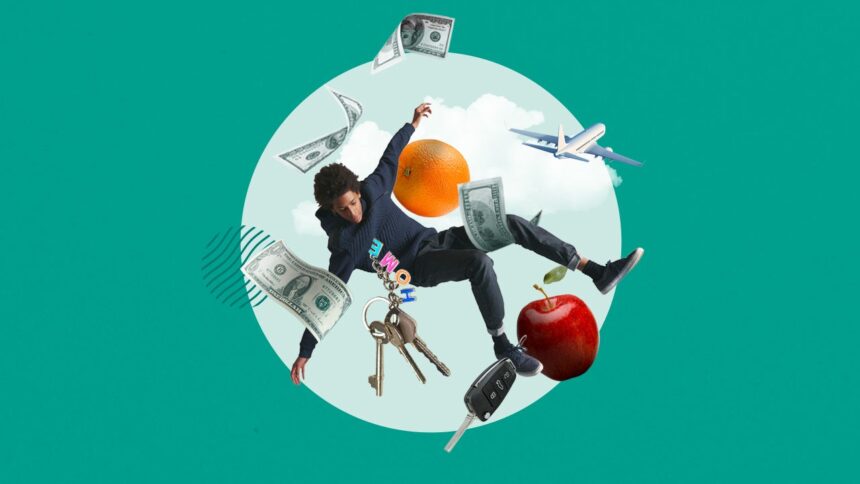Key takeaways
- The present annual inflation charge is 3%, however between Might and June, inflation edged decrease (-0.1%) on a month-to-month foundation, the primary decline for the reason that pandemic.
- Costs are nonetheless 20.8% costlier for the reason that pandemic-induced recession started in February 2020, with simply 6% of the almost 400 objects the Bureau of Labor Statistics tracks cheaper in the present day.
- The Federal Reserve is carefully monitoring inflation and has raised rates of interest to fight it, however officers are searching for extra confidence that they’ll start to trim rates of interest.
Inflation appears to be like prefer it’s lastly trending in the appropriate course, and even the objects which have remained stubbornly scorching are starting to decelerate — clearing a path for the Federal Reserve to begin reducing rates of interest later this 12 months.
Inflation in June rose 3 % from a 12 months in the past, down from a 3.3 % charge in Might and returning again to the bottom ranges since early 2021, in line with the Bureau of Labor Statistics’ month-to-month shopper value index (CPI) report. On a month-over-month foundation, costs really fell 0.1 %, the primary lower within the month-to-month inflation charge for the reason that early days of the pandemic.
The decline is a optimistic signal for U.S. central bankers, who’ve been sticking with the very best rates of interest in over twenty years to chill inflation regardless of its potential penalties: larger unemployment and, the worst-case situation, a recession.
Even with the excellent news, shoppers should still really feel the pinch of inflation. Since February 2020, shopper costs have elevated 20.8 %, a Bankrate evaluation of Bureau of Labor Statistics knowledge exhibits. That’s properly above the historic common for a four-year interval. For comparability, inflation rose 18.9 % within the 2010s, 28.4 % within the 2000s and 32.4 % within the Nineteen Nineties. The post-pandemic value burst means People would wish about $1,208 to purchase the identical items and providers that price $1,000 when the coronavirus-induced recession occurred.
A bit little bit of inflation is sweet for shoppers. The financial system retains rising and companies proceed increasing, hiring staff and bumping up their pay alongside the best way. An excessive amount of inflation, nonetheless, feels akin to taking a pay minimize. Excessive inflation has penalties past simply affordability, complicating saving for emergencies or investing for retirement.
Searching for the most recent info on shopper costs? Right here’s a round-up of the place inflation is bettering — and the place it’s nonetheless remaining cussed.
With plentiful indicators of a cooling financial system, the CPI for June definitely constitutes the ‘extra good knowledge’ on inflation that Fed Chair Jerome Powell has mentioned we have to see earlier than the Fed can start reducing rates of interest. With each headline and core readings coming in decrease than anticipated, this aligns with a September rate of interest minimize.
— Greg McBride, CFA , chief monetary analyst for Bankrate
Highlights of the most recent statistics on inflation
- Total inflation in June 2024: 3%, down from 3.3% in Might
- Core costs (excluding meals and vitality): 3.3%, down from final month’s 3.4% improve
- Meals costs: 2.2%, edging up from 2.1% in Might however matching the two.2% stage from April and March
- Meals away from residence (eating out at eating places): 4.1%, up barely from 4%
- Meals at residence (groceries): 1.1%, up barely from 1%
- Companies: 5%, down from 5.2% in Might and April
- Vitality: 0.9%, down quickly from 3.5% in Might
- Gasoline: -2.5%, down from a 2.2% improve in Might
- Motorcar insurance coverage: up 19.5%, down from 20.3% in Might, 22.6% in April and 22.2% in March
- New automobiles: -0.9%, down from -0.8% in Might and -0.4% in April
- Used automobiles and vans: -9.5%, down from -8.6% in Might, -6.3% in April and -1.9% in March
What’s the present inflation charge?
Inflation rose 3 % in June from a 12 months in the past, marking three straight months of slowing inflation, the most recent Bureau of Labor Statistics report confirmed. Excluding the risky meals and vitality classes, so-called core costs additionally dipped to three.3 % from 3.4 %, the bottom since April 2021.
Taken collectively, the figures mirror a return to the disinflation that had been benefiting shoppers and policymakers on the Federal Reserve within the second half of 2023. Inflation can be nonetheless properly under its peak in June 2022, when it smashed 9.1 %.
Costs which can be rising probably the most
Of the almost 400 objects that BLS tracks, about 2 in 3 (or 67 %) elevated in value between June 2023 and 2024.
In line with BLS, these are the costs that elevated most over the previous 12 months:
| Merchandise | June 2023-June 2024 improve |
|---|---|
| *Denotes an merchandise that isn’t seasonally adjusted | |
| Frozen noncarbonated juices and drinks* | 20.2% |
| Motorcar insurance coverage | 19.5% |
| Video discs and different media* | 18.3% |
| Admission to sporting occasions | 15.1% |
| Care of the sick and aged at residence* | 11.4% |
| Raw meats, apart from beef and veal* | 10.5% |
| Eggs | 10.2% |
| Photographic gear and provides | 10.1% |
| Raw beef roasts | 10% |
| Indoor vegetation and flowers | 9.4% |
Month-over-month value adjustments, nonetheless, can provide shoppers a extra real-time take a look at the costs which have not too long ago been popping — or slowing. Decrease costs in the identical year-ago interval, for instance, may cause an merchandise to appear like it’s gaining velocity, when it’s slowing in actuality.
Living proof: Again in Might, vitality costs rose 3.5 % over the 12-month interval, showing to be gaining velocity from the April’s 2.5 % annual improve regardless of dipping 2 % over the month. The explanation for the discrepancy? Might 2023 was a less expensive month for vitality prices.
Shoppers, nonetheless, ought to take seasonal differences under consideration. BLS doesn’t seasonally modify all of its objects, and year-over-year inflation charges can higher clean out these variations.
In line with BLS, these are the costs that elevated most over the previous month:
| Merchandise | Might 2024-June 2024 improve |
|---|---|
| Girls’s outerwear | 5.9% |
| Jewellery | 4.4% |
| Different intercity transportation | 3.6% |
| Eggs | 3.5% |
| Citrus fruits | 3.2% |
| Pork chops | 3.1% |
| Raw meats, apart from beef and veal | 3% |
| Window coverings | 3% |
| Margarine | 2.9% |
| Leisure books | 2.8% |
Why is inflation so excessive proper now?
Shoppers would possibly take a look at the large 20.2 % improve in frozen noncarbonated drink costs and marvel why the general inflation charge is simply 3 %. To place it merely, the Bureau of Labor Statistics assigns weights to every particular person good or service it tracks, primarily based on how prevalent it’s thought of to be in a shopper’s month-to-month funds.
At present, the principle contributors to inflation are shelter and motorized vehicle insurance coverage, although housing is starting to enhance. Lease of major residence, as an illustration, rose by the slowest tempo since 2021.
- Lease accounted for 60 % of the annual 3 % improve in June.
- Motorcar insurance coverage, in the meantime, contributed 17 % to this month’s annual inflation charge.
- Put one other approach, inflation would’ve risen 2.5 % in June had motorized vehicle insurance coverage costs remained steady and 1.2 % had rents not elevated.
“One-in-a-row is just not a streak,” McBride says. “However extra readings like this within the months forward is per getting inflation all the way down to a 2 % annual charge.”
The drivers of inflation have modified dramatically for the reason that preliminary post-pandemic value burst. When value pressures peaked in June 2022, shelter was driving simply 20 % of the annual improve in costs. However as shoppers emerged from lockdowns with large pent-up demand concurrently world provide shortages, vitality was driving a couple of third (32 %) of inflation, whereas meals costs had been driving 15 % of inflation.
The altering drivers of inflation have developed as a lot because the U.S. financial system. Provide chains have untangled for the reason that pandemic, serving to take the stress off of products inflation. Nevertheless, providers corresponding to hire, insurance coverage and even the worth of eating out can take months, if not years, to fluctuate — relying on what’s occurring with labor prices and shopper spending.
To fight inflation, officers on the Federal Reserve have lifted borrowing prices from a rock-bottom stage of near-zero % to a 23-year excessive of 5.25-5.5 %. But, the U.S. financial system has remained surprisingly resilient, underpinned by booming hiring.
Publish-pandemic inflation: What’s risen probably the most and what’s gotten cheaper
Of the almost 400 objects BLS tracks, simply 21 (or roughly 6 %) are cheaper in the present day than they had been pre-pandemic. Greater than 2 in 5 (46 %) of these objects rose at a quicker clip than general inflation.
To make certain, costs are anticipated to rise within the healthiest of economies — although solely regularly, at a goalpost of round 2 % a 12 months.
In line with BLS, these are the highest 10 objects which have jumped probably the most in value for the reason that pandemic:
| Merchandise | February 2020-June 2024 improve |
|---|---|
| *Denotes an merchandise that isn’t seasonally adjusted | |
| Margarine | 56.4% |
| Frozen noncarbonated juices and drinks* | 51.3% |
| Eggs | 49.3% |
| Different fat and oils, together with peanut butter | 47.8% |
| Motorcar insurance coverage | 47.2% |
| Motorcar restore | 45.2% |
| Gasoline oil | 42.8% |
| Crackers, breads and cracker merchandise | 42.5% |
| Restore of home items | 41.6% |
| Leased automobiles and vans | 41.5% |
In the meantime, the objects which have dropped in value probably the most for the reason that pandemic are primarily items and electronics — largely due to bettering provide chains.
| Merchandise | February 2020-June 2024 lower |
|---|---|
| Smartphones* | -53.4% |
| Phone {hardware}, calculators, and different shopper info objects | -45.7% |
| Info know-how commodities | -23.1% |
| Televisions | -22.1% |
| Training and communication commodities | -20.2% |
| Medical health insurance* | -17.8% |
| Pc software program and equipment* | -16.3% |
| Different video gear | -15.5% |
| Video and audio merchandise | -12.5% |
| Males’s fits, sport coats and outerwear | -9.5% |
Inflation breakdown by product class
Searching for a simple evaluation of how inflation is impacting the important thing objects in your funds? Right here’s what Bankrate discovered.
The totally different strategies of measuring inflation: PCE versus CPI
- Total inflation in Might 2024: 2.6% from a 12 months in the past, down from 2.7% in April and March
- Core costs (excluding meals and vitality): 2.6% from a 12 months in the past, down from 2.8% in April, Might and February
- Meals costs: up 1.2% from a 12 months in the past, down from 1.2% in April
- Companies: up 3.9% from a 12 months in the past, down barely from 4% in April
- Vitality items and providers: up 4.8% from a 12 months in the past, a rise from 3% in Apriil
Fed policymakers take a look at the complete image of financial knowledge when setting rates of interest. However formally, they like a special measure to see whether or not they’re succeeding at controlling inflation: the Division of Commerce’s private consumption expenditures (PCE) index.
However that choice has been retaining Fed watchers on their toes. These days, the PCE index has been indicating slower inflation, with general costs greater than half a proportion level above the Fed’s goal — in comparison with a warmer one proportion level as proven with CPI.
These variations have at all times been afoot. Primarily, they’re due to methodology variations. For starters, PCE takes shoppers’ substitutions under consideration (for instance, one household’s choice to purchase fish over meat for one month as a result of it’s cheaper).
However one other key distinction is accountable currently. Each businesses estimate an merchandise’s relative significance otherwise, with BLS’ gauge giving probably the most weight to the class of inflation that’s coincidentally been the most well liked: shelter.
For Fed officers, the story stays largely the identical: Inflation is slowing however nonetheless stubbornly above their 2 % goalpost. But, when officers do determine to alter coverage — together with reducing rates of interest — the variations might make the choice trickier. Fed officers don’t wish to danger reducing rates of interest too quickly, for concern that it might stoke even larger inflation if it causes demand to rise once more.
QUOTE
Takeaways for shoppers
For shoppers, the message is evident: Inflation has cooled dramatically since peaking in the summertime of 2022, although it stays undefeated. The last word query now could be whether or not the U.S. financial system’s resilience is retaining inflation elevated. Whether it is, the Fed would possibly must gradual the monetary system down extra to complete the job, finally risking shoppers’ paychecks and employment if it dents the strong job market.
- Anticipate higher-for-longer charges from the Fed: Fed Chair Jerome Powell has mentioned that officers want to chop rates of interest lengthy earlier than costs hit 2 % on an annual foundation. In the event that they don’t, they danger slowing the financial system down an excessive amount of for too lengthy. But, officers say they want extra confidence that inflation is retreating again to their goal, which means rates of interest are more likely to stay excessive — retaining borrowing prices costly however financial savings yields profitable.
- Comparability store as a lot as you may: Shoppers know to check affords from a number of lenders earlier than locking in a mortgage. Why not the identical for the objects you purchase regularly? Comparability procuring might help be sure you’re shopping for the most cost effective product available on the market. Examine costs at a number of retailers, see if any shops supply value match and craft a funds. If a product or ingredient pushes your spending aim over the sting, take into account swapping it out for one thing else.
- Use the non-public finance instruments at your disposal: Discovering the appropriate bank card that helps you earn rewards on the purchases you had been already going to make might be one other strategy to pad up your pockets. Simply make sure you’re not carrying a steadiness. A 20.71 % rate of interest won’t ever outweigh the money again.
- Save for emergencies and discover the appropriate account: Traditionally, investing within the markets has been one of the best ways to beat inflation, however in the present day’s high-rate period means savers can discover a market-like return with none of the chance. Stash your money in a high-yield account or add a longer-term CD to your portfolio, so you may lock in these elevated yields for the lengthy haul.











